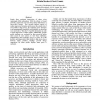Free Online Productivity Tools
i2Speak
i2Symbol
i2OCR
iTex2Img
iWeb2Print
iWeb2Shot
i2Type
iPdf2Split
iPdf2Merge
i2Bopomofo
i2Arabic
i2Style
i2Image
i2PDF
iLatex2Rtf
Sci2ools
ICWSM
2008
2008
Thin Slices of Online Profile Attributes
People form consistent impressions of others given surprisingly little information. With the advent of social networks, impressions now may form online rather than in a face-to-face context. This research explores aspects of online impression formation and discusses the crucial role of user profiles in this process. By examining users' decisions in an experimentally controlled social network, we show that users need only a "thin slice" of profile information in order to form impressions of others online. Additionally, specific profile attributes are evaluated for their perceived utility (how much do users choose to view these attributes), predictiveness (how well they serve as a proxy for a full profile), and diagnosticity (their ability to help users choose between online profiles). Findings provide design suggestions for better profile displays when space is restricted.
Consistent Impressions | ICWSM 2008 | Internet Technology | Online Impression Formation | Social Network |
| Added | 29 Oct 2010 |
| Updated | 29 Oct 2010 |
| Type | Conference |
| Year | 2008 |
| Where | ICWSM |
| Authors | Kristin Brooke Stecher, Scott Counts |
Comments (0)

